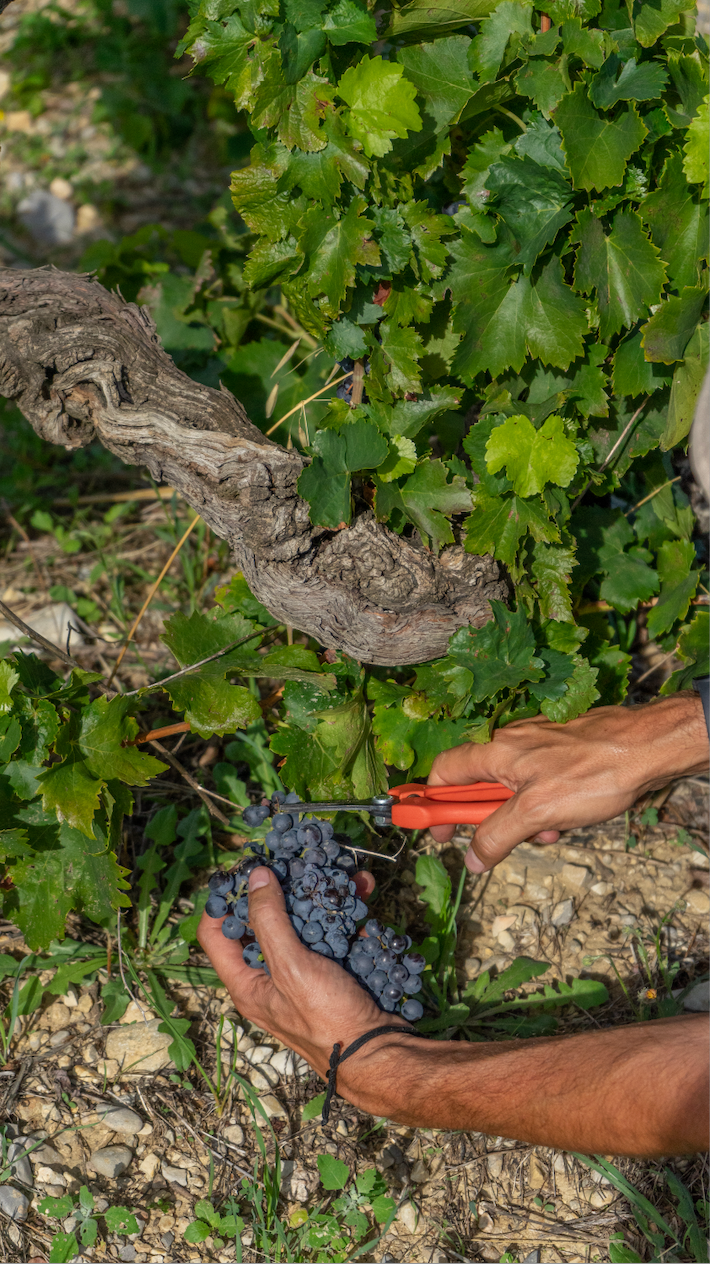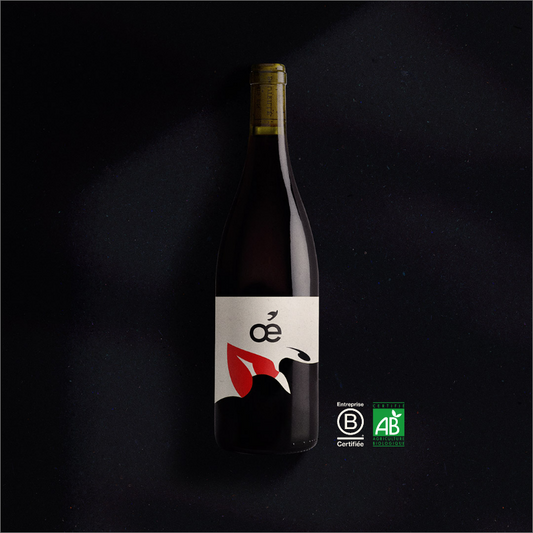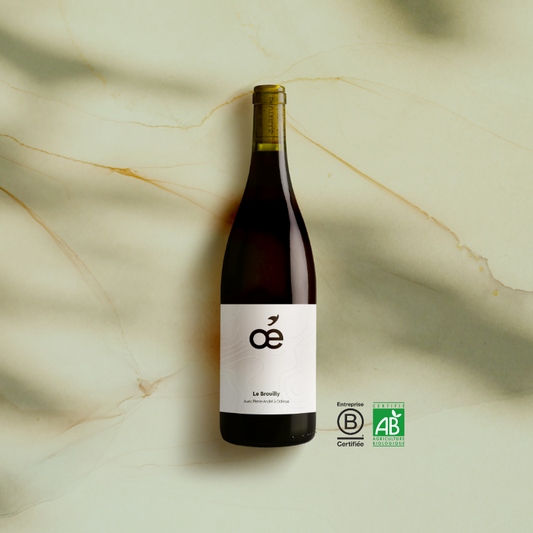Organic wine, natural wine & biodynamic wine: is there a difference? “Am, stram, gram, pic and pic and colegram, am, stram, gram, pic!”
It's sometimes easier to draw lots than to make a choice, especially if you don't have all the keys in hand. In this article, we invite you to see what are the particularities of each so that there is no more chance during your next tastings.
organic wine
Offering good, healthy and responsible wine is the credo of organic wine. In organic farming , phytosanitary products and chemical pesticides are prohibited for the greater good of our planet. In the short term, these chemicals , like weedkillers, are so effective that they kill pests as well as harmless plants and animals. In the long term, the earth is deeply damaged and the natural balance is upset. It is because of these harmful products that the land suffers erosion and becomes arid and without nutrients. That's all it takes for organic wine producers to turn to more ecological and sustainable solutions .
The earth is like us, it likes to be taken care of, so the winegrowers use natural fertilizers to give it all the strength it needs. Do you also take your small dose of vitamins in winter? It is the same for plants and in our case, the vine.
When we take the time to look at skincare and health, we realize that there are many natural alternatives to the industrial products we use today. The toothpaste can be replaced by a mixture of salt, mint, pepper and dried flowers as the Egyptians did in Antiquity or by a mixture based on ashes (yes yes, that of the fire of the fireplace). To pamper his soil, the winegrower uses organic fertilizers that promote soil life and please earthworms, for example.

Since 2012, winemaking has also been supervised by the French and European organic label . As with appellations, products from organic farming are controlled by specifications that take into account inputs , doses of sulphites , filtration methods, etc.
Only natural inputs are allowed such as indigenous yeasts, sulfur or copper.
To produce a good organic wine , winegrowers have the right to doses of sulphites lower than those authorized for conventional wines (about 50 mg/l less on average). Sulfites , also known as sulfur , are naturally present on the skin of grapes, they are not dangerous but be careful all the same because in excess, they are responsible for your headaches. So an organic wine , in addition to being good for nature, is better for your health!
biodynamic wine
Biodynamics is a philosophy of life. The biodynamic winegrowers live to the rhythm of nature and pass on their love of the terroir to their wines. Cradled by the lunar cycles , the vines grow in a healthy environment . Companionship is widely used to promote mutual aid between plants in a natural way and to respect the ecosystem. In biodynamics also fertilizers and natural fertilizers are in order, there are solutions that can make some people smile, such as horn dung which is a powerful builder of the soil structure . The winegrowers also take care of their vines with herbal preparations such as nettle, dandelion, oak, chamomile or valerian. Dry plants can also be used (buckthorn, yarrow, fern, wicker, meadowsweet). When you see all these natural treatments, you almost want to turn into a vine! Indulge yourself at home with homemade fruit juices and herbal teas from the garden to do your body good.
Biodynamic wine is both good for nature, thanks to its responsible viticulture , and just as good in the bottle. The Biodyvin and Demeter labels ensure the proper conduct of winegrowers during vinification so that the wines meet very specific criteria. The authorized sulphite levels are even lower than those of organic wines and the winegrowers follow the cosmic rhythms . For example, they avoid working wine during lunar nodes , which have a negative influence, or when the planets are in conjunction because life processes are slowed down and weakened.

The biodynamic philosophy is fascinating and if you want to know more you can read our articles on biodynamics: Biodynamics, should you walk naked in the vines? ; Biodynamics, one more step on organic farming ; Vinification and biodynamics
natural wine
Natural wines , also called natural wines , have existed since the dawn of time but have never had legal value. Recently, it 's the nature method wine label that decided to break the lines to bring some visibility and credibility to these wines so special and deliciously unique. This first official label is a logical continuation of the investment and determination of winegrowers in natural viticulture who work every day to produce a healthy, responsible and natural wine . The association of natural wines (AVN) created in 2005 brings together committed winegrowers and is based on a principle of transparency. In this association , good advice makes good friends, so no jealousy, we share winemaking methods , so that everyone can have a more qualitative and environmentally friendly production method.
A natural wine is a wine that has no mask. He shows his faults and his qualities to everyone. The cultivation of the vines is done as for organic wines and biodynamic wines with respect for nature, without chemical pesticides and with natural fertilizers far from the chemical fertilizers used for conventional wines .
The little extra, the harvest is done by hand. We are never better served than by ourselves. So yes, the harvest takes longer but it's for a good cause!

During vinification, natural wine contains even less sulphites than its counterparts, its levels approach zero and some winegrowers decide not to add any at all. We then speak of HEALTHY wines (without any added inputs or sulphites) . Yes, because even if no sulphites are added, there will inevitably be traces of sulfur which are present naturally on the grapes . The yeasts used are indigenous and no brutal method of wine transformation is allowed.
Natural wine is less stable because it is hardly modified or balanced, and as is often said, when you work with nature, you know she has the last word . The sulfur helps stabilize the wine and prevents it from oxidizing if it is mistreated during transport between the winemaker who produced it and the store where you buy it. These living wines have the advantage of offering you a unique experience and everyone is free to appreciate or not the marked aromas of these wines. Nature has many surprises in store, some natural wines look like grape juice, others sparkle slightly in the mouth, some are very strong while others have very supple tannins . In short, natural wine cannot be described, it must be tasted.
Make your taste buds dance with our selection of good white wines, red wines and rosé wines . All our wines are organic and committed , for a more beautiful nature and a better nourished belly.





